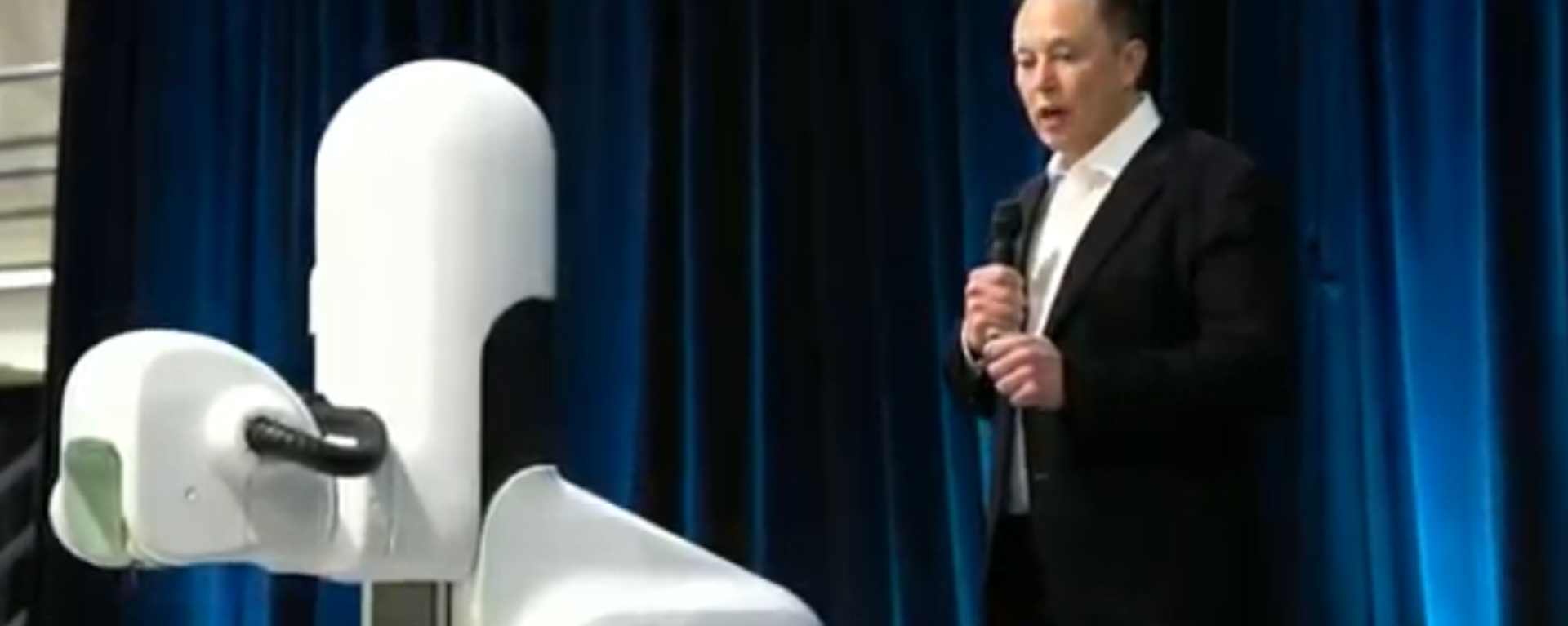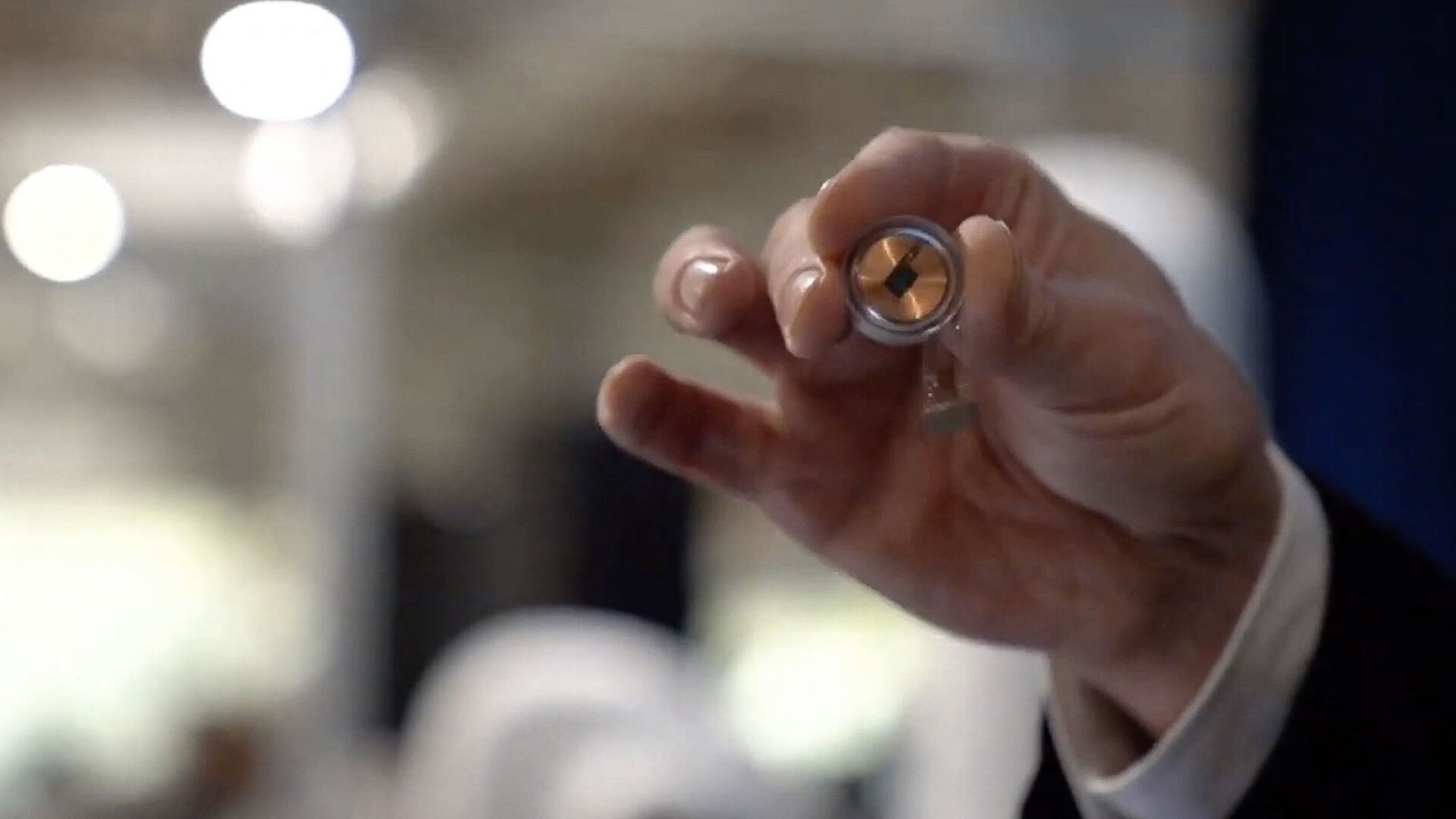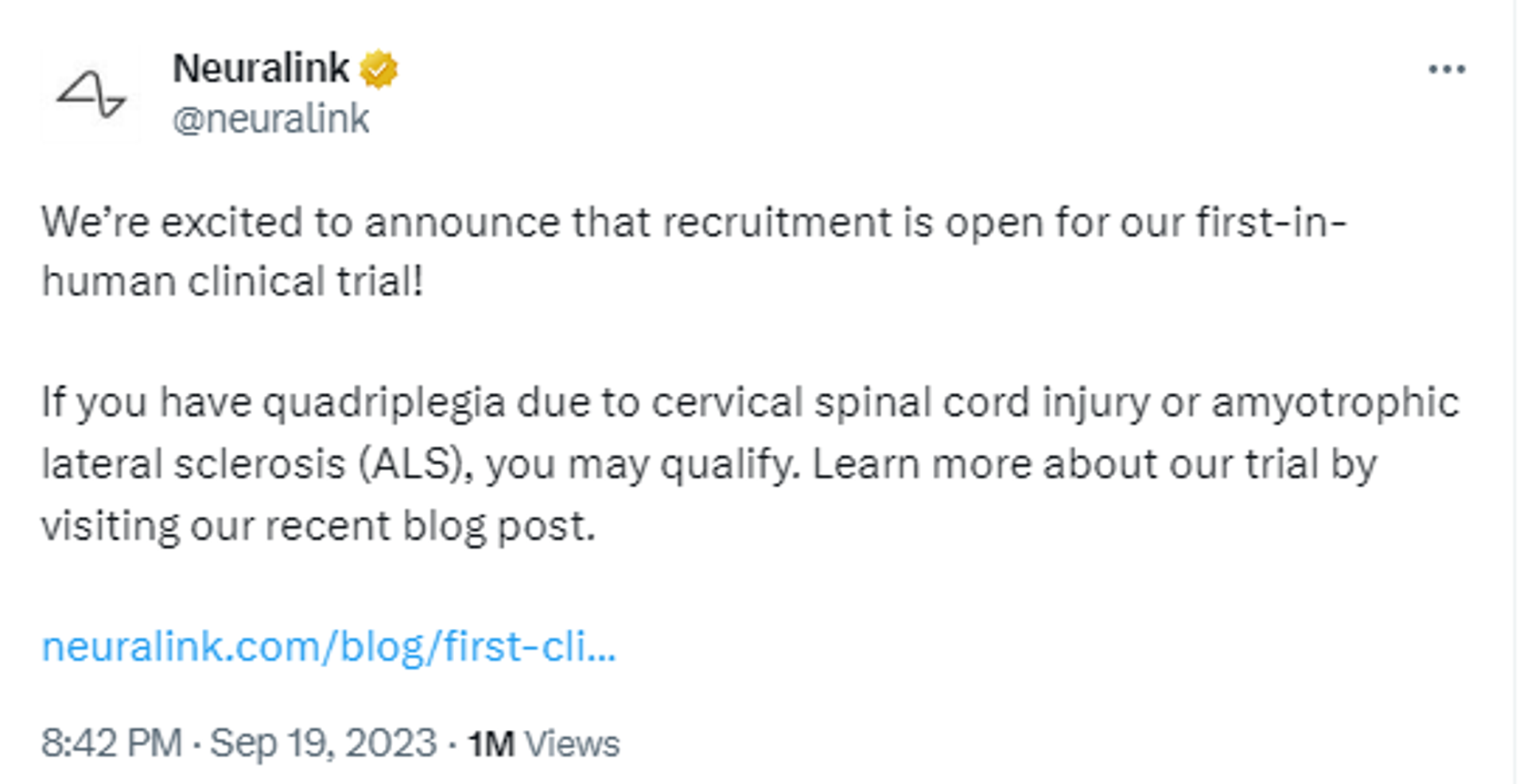https://sputnikglobe.com/20230920/elon-musks-neuralink-to-launch-trial-of-first-implant-in-a-human-brain-1113516765.html
Elon Musk’s Neuralink to Launch Trial to Plug First-Ever Implant Into Human Brain
Elon Musk’s Neuralink to Launch Trial to Plug First-Ever Implant Into Human Brain
Sputnik International
Elon Musk’s brain implant company, Neuralink, has announced that it received approval from an independent review board to begin the first human trial of its brain implant for paralyzed patients.
2023-09-20T09:14+0000
2023-09-20T09:14+0000
2023-09-20T09:42+0000
beyond politics
elon musk
neuralink
artificial intelligence (ai)
food and drug administration (fda)
science & tech
https://cdn1.img.sputnikglobe.com/img/07e5/05/02/1082784672_106:216:2363:1486_1920x0_80_0_0_f030d4714ad28caaa6c29da2c200a1e8.jpg
Elon Musk’s brain implant company, Neuralink Corp, has announced that it received approval from an independent review board to begin the first human trial of its brain implant for paralyzed patients.The brain-computer interface (BCI) company added that the “ground-breaking investigational medical device trial for our fully implantable, wireless BCI aims to evaluate the safety of our implant and surgical robot, and assess the initial functionality of our BCI for enabling people with paralysis to control external devices with their thoughts.”As for who can qualify for the six-year study, Neuralink is seeking out patients with paralysis caused by cervical spinal cord injury or amyotrophic lateral sclerosis (ALS). Participants recruited for the trial will have a proprietary robot surgically implant the BCI in a region of their brain that controls movement.Accordingly, it is hoped that the device will enable them to control a keyboard or the computer cursor by the power of their thoughts.The purpose of the trial is to test the safety and efficacy of Neuralink's implantable BCI, called “the Link,” which is a surgically embedded neural-chip implant designed to decode and stimulate brain activity.Neuralink's announcement comes after it got regulatory approval from the US Food and Drug Administration (FDA) in May for its first human trials.However, the company has faced trials of its own along the way: its previous testing in animals prompted a great deal of scrutiny after reports that trials were causing unnecessary suffering, and the death of 1,500 animals between 2018 and 2022, according to reports. It was also claimed that all sorts of human errors had occurred because of the company’s impatience to reach its ambitious goals.If Neuralink's device proves safe for human use, it could, nevertheless, take decades before it is cleared for patients outside the realm of clinical trials, experts have emphasized.
https://sputnikglobe.com/20221201/elon-musks-neuralink-might-start-clinical-trials-with-humans-in-six-months-1104918634.html
https://sputnikglobe.com/20210409/elon-musk-showcases-monkey-playing-pong-with-its-mind-using-neuralink-brain-implants---video-1082583310.html
Sputnik International
feedback@sputniknews.com
+74956456601
MIA „Rossiya Segodnya“
2023
News
en_EN
Sputnik International
feedback@sputniknews.com
+74956456601
MIA „Rossiya Segodnya“
Sputnik International
feedback@sputniknews.com
+74956456601
MIA „Rossiya Segodnya“
elon musk, brain implant company, neuralink, independent review board approval, neuralink's first human trial, brain implant for paralyzed patients.
elon musk, brain implant company, neuralink, independent review board approval, neuralink's first human trial, brain implant for paralyzed patients.
Elon Musk’s Neuralink to Launch Trial to Plug First-Ever Implant Into Human Brain
09:14 GMT 20.09.2023 (Updated: 09:42 GMT 20.09.2023) Neuralink, the neurotechnology company founded by Elon Musk that is building a brain-computer interface that can be implanted in the human brain - allowing bidirectional communication between the mind and external devices - received approval from the US Food and Drug Administration (FDA) in May to conduct its first human trials.
Elon Musk’s brain implant company, Neuralink Corp, has announced that it received approval from an independent review board to begin the first human trial of its brain implant for
paralyzed patients.
"We are happy to announce that we’ve received approval from the reviewing independent institutional review board (FDA) and our first hospital site to begin recruitment for our first-in-human clinical trial,” Neuralink said in a statement on Tuesday.
The brain-computer interface (BCI) company added that the “ground-breaking investigational medical device trial for our fully implantable, wireless BCI aims to evaluate the safety of our implant and surgical robot, and assess the initial functionality of our BCI for enabling people with paralysis to control external devices with their thoughts.”
As for who can qualify for the six-year study, Neuralink is seeking out patients with paralysis caused by cervical spinal cord injury or amyotrophic lateral sclerosis (ALS). Participants recruited for the trial will have a proprietary robot surgically implant the BCI in a region of their brain that controls movement.
Accordingly, it is hoped that the device will enable them to control a keyboard or the computer cursor by the power of their thoughts.
The purpose of the trial is to test the safety and efficacy of Neuralink's implantable BCI, called “the Link,” which is a surgically embedded neural-chip implant designed to decode and stimulate brain activity.

1 December 2022, 07:04 GMT
Neuralink's announcement comes after it got
regulatory approval from the US Food and Drug Administration (FDA) in May for its first human trials.
If successful, the cutting-edge technology developed by Neuralink could revolutionize various fields, including healthcare, communication, and human-computer interaction, with potential applications ranging from helping individuals with neurodegenerative disorders, such as Parkinson's or Alzheimer's disease, to enhancing cognitive abilities and enabling novel methods of information processing.
However, the company has faced trials of its own along the way: its previous testing in animals prompted
a great deal of scrutiny after reports that trials were causing unnecessary suffering, and the death of 1,500 animals between 2018 and 2022, according to reports. It was also claimed that all sorts of human errors had occurred because of the company’s impatience to reach its ambitious goals.
If Neuralink's device proves safe for human use, it could, nevertheless, take decades before it is cleared for patients outside the realm of clinical trials, experts have emphasized.





